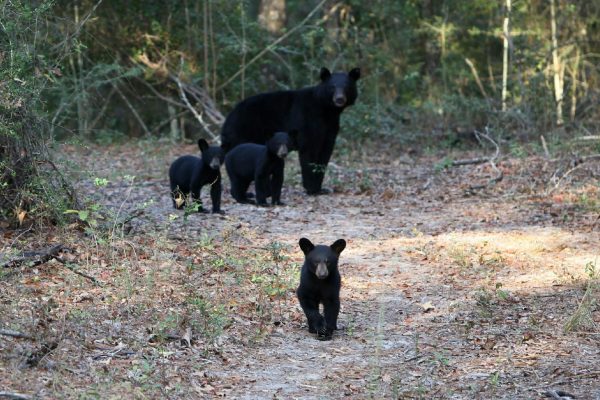A project that examines the denning behavior of Alabama’s black bear population and its impact on reproduction and cub survival has received a $1.1 million grant from the Alabama Department of Conservation and Natural Resources.
The grant provides new funding for a five-year study on bears in Alabama directed by Todd Steury, associate professor of wildlife ecology in the School of Forestry and Wildlife Sciences at Auburn University.
Steury said the new grant will aid his research in three critical ways.
“We want to understand, first, what proportion of cubs make it to adulthood, and what the cause of death is for the ones that don’t. Secondly, we want to find out where the females den for giving birth and the quality of those dens. Finally, we want to see where the cubs that make it to adulthood disperse to and whether they are able to become part of the breeding population,” Steury said.
“These questions are a priority because anecdotal evidence from our own field research suggests that many of the cubs that are born are not surviving to adulthood. Thus, we need to determine if that’s actually true and if so, why.”
Chuck Sykes, director of the Wildlife and Freshwater Fisheries Division at the Alabama Department of Conservation and Natural Resources, said the state is home to one of the smallest and most fragmented black bear populations in North America.
“Given the relatively small size of the population and its isolation from other bear populations, what happens to young bears when they disperse from the mother is of particular concern,” Sykes said.
“Anecdotal observation suggests that black bears in south Alabama may be lacking in appropriate denning habitat, and many young appear to be lost before they recruit into the population, which may be the cause of the stagnant growth of the population. Thus, effective management and conservation requires more information on its reproductive ecology and ultimate viability.”
Steury said examining the dwellings of bears concentrated in Washington County, just north of Mobile, is key.
“Bears usually den in caves, under rock outcroppings, and in hollowed-out trees. The Mobile area doesn’t really have caves or rock outcroppings, and the old, hollow cypress trees have long since been chopped down,” Steury said. “Consequently, most of our Mobile bears seem to just build nests on the ground—hollowed out depressions, lined with vegetation. We’re concerned that these nests don’t offer good protection from predators and the elements for cubs, and hence may result in poor cub survival.”
School of Forestry and Wildlife Sciences Dean Janaki Alavalapati said this continued research is vital.
“Dr. Steury’s research on the declining population of black bears in Alabama will yield information that is critical to preserving the species in the state,” said Alavalapati. “This study will lead to efforts to protect the bears and ensure that they thrive.”
In the current phase of the project, Steury and his research team are visiting Alabama bear dens, taking measurements of den characteristics and fitting cubs with expandable radio-telemetry collars. They will monitor the cubs for nine months, until the young bears are self-sufficient and have made it past the initial stage of mortality.
When the cubs are 2 years old—the age in which they typically disperse from their mothers—they will be caught again and equipped with GPS-enabled radio-telemetry collars to track their dispersal patterns and determine whether they recruit into the population.
Steury said the renewed funding makes this critical portion of the bear study possible.
“Our previous grant only allowed us to study adult bears—where they are, how many they are, their movements and habitat use, and their genetic makeup. The previous grant also funded a public survey of how people feel about bears in Alabama,” he said. “However, the previous grant didn’t include funding for a detailed examination of bear reproduction.”
The research on bear denning, reproduction and cub survival, dispersal and recruitment (population growth rate by birth or immigration) will continue through 2023.
Written by Teri Greene










